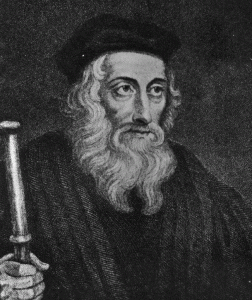 Today (December 31) is the day that John Wycliffe died of natural causes in 1384. He was an all-around scholar, excelling in philosophy, theology, and languages. His doctrines and his agitations for the reform of the church got him in trouble with the authorities, but he was not actually killed for any of that. In the next generation, his books were burned, his name was cursed, and his bones were dug up to be burned and scattered in the river. In the next generation after that, he began to be seen as one link in a long chain of attempted reforms of the church. By the early sixteenth century, his work as a theologian and translator led Protestants to call him “the morning star of the Reformation,” and to see the lines of continuity between his work and theirs. In the twentieth century, his reputation as an important philosophical theologian has been rehabilitated, and many of his works unavailable for a long time are now available in English.
Today (December 31) is the day that John Wycliffe died of natural causes in 1384. He was an all-around scholar, excelling in philosophy, theology, and languages. His doctrines and his agitations for the reform of the church got him in trouble with the authorities, but he was not actually killed for any of that. In the next generation, his books were burned, his name was cursed, and his bones were dug up to be burned and scattered in the river. In the next generation after that, he began to be seen as one link in a long chain of attempted reforms of the church. By the early sixteenth century, his work as a theologian and translator led Protestants to call him “the morning star of the Reformation,” and to see the lines of continuity between his work and theirs. In the twentieth century, his reputation as an important philosophical theologian has been rehabilitated, and many of his works unavailable for a long time are now available in English.
Wycliffe’s treatise on scripture is especially fascinating. Early in that work, he distinguishes five meanings of the term “sacred Scripture,” or “five degrees,” as he calls them, of the theological meaning of “holy writings.” The five degrees are all somewhat odd. First is the Book of Life mentioned in Revelation 20. Second is “the truths written in the Book of Life in their ideal being.” Third is the truths which are to be believed in general, which are written in the Book of Life in their existence and effects. Fourth are truths which are written in the souls of men. And fifth, scripture means “the books or sounds or other artificial signs of truth.” Even at a glance, you can see that Wycliffe’s thoughts are all bound together, from his mode of Bible reading to his metaphysical and epistemological ideas.
When you look up Wycliffe in Blackwell’s recent series of books on theologians from major periods of church history, you find him in the volume on Medieval Theologians rather than the one on Reformation Theologians. However much Wycliffe may have been a forerunner of the Reformation, I think locating him in the Medieval period is more than just a judgment about his chronological placement in the fourteenth century. When you read Wycliffe, you are very much engaging a medieval Christian theologian, who does not stand out from his context as if he were born in the wrong time period. Rather than drag him forward to the sixteenth century to show his Protestant credentials, it is better to see that he is a man of the middle ages with some Protestant credentials in hand. The fact that he belongs so thoroughly to the fourteenth century means that the concerns of the Reformation belong at least that far back in church history.